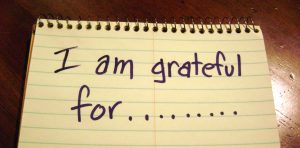15 July 2016 by Lisa Meloncon
The world seems out of kilter and the daily onslaught of news about violence and injustice can easily overwhelm and distract. Each of us, however, copes in our own way. Some may ramp up their activism. Others may turn to faith and local communities. While still others, may simply do things that are private and behind the scenes.
Finding a way to balance the scary, horrific, unjust, and just crazy world with the day-to-reality of our lives can be a struggle. I have no sage advice on how to get involved and make a difference because I’ve always found these sorts of decisions are intensely personal, painfully contingent, and as rhetoricians know, always contextual.
So today I offer the long-standing, tried, and true advice: gratitude. The google definition that pops us tells us gratitude is the quality of being thankful; readiness to show appreciation for and to return kindness.
 My strategy of self care as of late has been to prioritize gratitude, that is, to be deliberate and conscious about the things we are grateful for and to be certain to return kindness or simply to bestow them. It helps me focus on the positive events around me, and in some small measure, it helps me feel as though I am making a tiny difference.
My strategy of self care as of late has been to prioritize gratitude, that is, to be deliberate and conscious about the things we are grateful for and to be certain to return kindness or simply to bestow them. It helps me focus on the positive events around me, and in some small measure, it helps me feel as though I am making a tiny difference.
While many smarter and wiser folks before me have said it, a good strategy to start each day is to write down the three to five things that you are most grateful for. As we know, the material act of writing does something to us. It enacts an embodiment of becoming and doing and even making. Recent world events have made this practice even more important for me, as it reminds that there is still good out there in both little and big things.
Here is a sampling of my gratitude list over the last couple of weeks:
- finding the words to answer this question posed by my 6-yr old great niece, “why are people so mean?”
- having a full week where my body didn’t let me down
- enjoying the time (and privilege) or being able to write
- relishing a silly conversation about eye shadow and you tube videos on make-up application with my almost 15-yr old goddaughter
- finding out my new office at school did indeed have a window
- reading lots of cool and interesting project ideas floating through the #medrhet community
- managing a revision where the comments actually made it better
- laughing with various friends over everything and nothing
- sharing some meatballs (a major guilty pleasure) with a colleague
- giving silly gifts to folks here that I brought back from my time in Florida
- saying an official goodbye to two lovely people who I loved so much and miss even more
- talking with a friend/colleague and realizing you’ve been on the phone for 2 ½ hours
- hearing from alums and enjoying their success
By know means a comprehensive list, but it shows the variety of things that I write down on any given day. My planner actually has a place for “good things that happened” so there’s a ready spot for my gratitude lists.
So as we’re moving toward the last past of our summers, trying to balance life and our thoughts and emotions in what seems like a world gone mad, I encourage you to take care of yourselves in whatever way that works for you.
And it’s always good to remember that you’re never alone. Never. An ongoing gratitude is this community and the knowledge that there are lots of people there to help in all sorts of ways.
Wishing you peace and joy.


